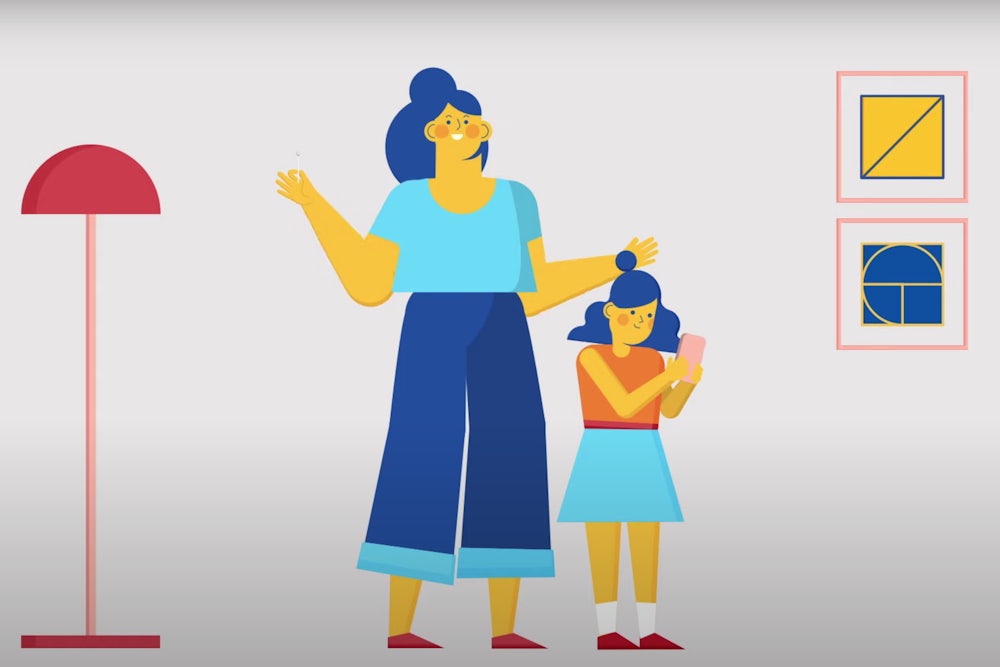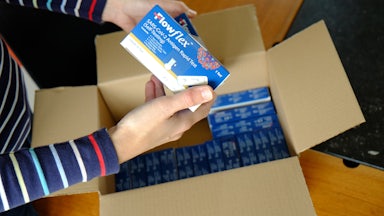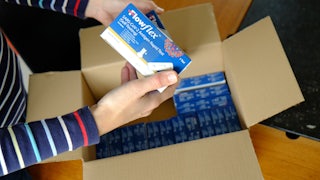Recently, holed up in my apartment awaiting the results of a Covid-19 test I’d waited three hours to secure from a publicly funded bus parked on the side of the road, I did what I imagine a lot of people experiencing inscrutable symptoms and a pervasive sense of ennui do. I opened Instagram, hoping to find a distraction. Unfortunately, social media platforms have a way of showing you exactly what you don’t want in moments of localized crisis, and so Instagram mostly told me what I already knew: All of my friends were either sick and quarantined or on their sixtieth hour or so of awaiting test results from LabQ, a private Brooklyn-based laboratory that has been scolded by New York Attorney General Letitia James for misrepresenting its PCR turnaround times.
There was a photo of testing lines crossing city blocks, a photo of someone in a Covid hotel, a photo of positive test results. Those grim images were briefly interrupted by the orange sherbet-colored boxes of On/Go at-home covid tests, offered in this case by a company named Ro. “Don’t panic trying to find a testing site,” the ad said. On the company’s website, I could buy two tests for $30, a bargain compared to the $100 kits sold by some enterprising retailers or the hassle of traveling to another state on the off chance I might find an open site.
Technically, the rapid Covid tests are being sold by Roman, Ro’s male health subsidiary. Around the time omicron panic set in, the On/Go at-home tests appeared on Roman’s website, improbably grafted in between medications for hair loss and premature ejaculation. The company, which launched in 2017, raised $500 million this year to expand its business based on the idea that on-demand health care will revolutionize the market, bringing its total investment to almost $900 million. In addition to Roman, it operates Rory (for women) and Zero (smoking cessation), along with a digital pharmacy and a service that amounts to Uber for in-home bloodwork. For a few months this spring, the company partnered with New York City to offer in-home vaccinations, utilizing the software it developed to schedule and track doctors; with the new round of investment, it hopes to remotely monitor patients with chronic conditions. Like a raft of similar companies that have exploded in recent years, it reimagines patients as consumers; it promises to “put you in control of your health,” with “no more taking time off from work, arranging for childcare, sitting in a crowded waiting room, or facing surprise bills.”
How depressing that almost two years into a public health crisis, as hospitals crumble and struggle to retain enough staff, among the only places to find an in-home test was a company founded to help men get it up, and that the next frontier of health care is a system designed to complement a culture in which it’s impossible to take time off when you get sick. This parallel health care market has become further entrenched through the pandemic—these private companies, many of them funded by venture capital and incubated in Silicon Valley, promise to upend the massive, unwieldly, expensive system that has failed so spectacularly to provide affordable and adequate care.
Facing an endless pandemic, watching omicron surge and running through uncanny scenes—crowded hospitals, long testing lines, chirpy Instagram ads stepping in to promise convenience and public good—it feels like the future is a spiralizing series of familiar scenes. We have vaccines and treatments and tests, but little has fundamentally changed about how the country manages a health crisis requiring consistency. Even The Atlantic’s Ed Yong, a typically measured voice, argues that while omicron shouldn’t be that serious, policy choices that have made it impossible for rural populations and low-income people to get tested or treated will be disastrous on a national scale.
In the vacuum where a widespread public health response might be, we have companies with nimble business models and endlessly customizable software to step in and put Band-Aids on gaping wounds. Almost a year ago, I reported for Jezebel on a hangover-cure startup that had pivoted from home IV treatments to Covid-19 testing, a company founded by two guys right out of college that had received municipal funding when cities struggled to source tests. For a brief moment they entertained offering vaccines and at-home testing; it appears in the nine months since, they’ve returned to focusing on $300 infusions to treat “brain fog” and stress. The cycle of glut and scarcity has been a near-constant since then: Recently, The New York Times reported that one of the country’s leading rapid-test manufacturers decided it wasn’t making enough money and ordered some 2,000 workers to destroy inventory before they were all laid-off, presenting a problem now that those tests are in high demand. So it’s hard not to feel somewhat cynical about a men’s health company getting in on the action when, until recently, the federal plan had been to force insurance companies to reimburse people who ordered similar tests.
Direct-to-consumer health care startups were popular before the pandemic. One Medical, a membership-based primary care startup, went public to great fanfare just a month before lockdowns swept the country. Not long after, workers criticized it for putting profits over worker safety and patient care; just this December, a House panel found the company did not distribute vaccines “equitably,” pushing people in search of inoculation to buy memberships and prioritizing the families of executives. But the failure of the company that arguably epitomized Silicon Valley’s obsession with health care to meaningfully disrupt anything didn’t slow the trend. In 2021, billions of dollars poured into direct-to-consumer health care companies that offered chat therapy or in-app medication purchases or treatment on demand. The medicalized model for startups has become so absurdly popular that Birchbox, a subscription beauty box, decided to jump into “FemTech” this year, offering blood tests that would determine which products it sent out.
Some of these companies surely stem from a genuine, if misplaced, desire to combat the forces that have made medical debt the leading cause of bankruptcy in the United States and allowed hundreds of thousands of vulnerable Americans to die of Covid-19. But more likely, we’re living through a moment in which a staggering number of companies have figured out how lucrative it is to harness the omnipresent terror that comes from living in a country where to get sick is to face not just illness, but the loss of a job, financial ruin, and medical debt that follows a person for the rest of their life. It’s a cyclical relationship: How profitable would a membership-based primary care office or a medical chatbot be if health care were otherwise accessible and cheap?
The long pandemic has instead pushed an already tottering system to its breaking point and provided private companies more of a landscape to exploit; the “health care deserts” Ro says it’s serving with its proprietary artificial intelligence have expanded significantly over the last year. At least 21 rural hospitals have closed with another 400 or so in danger of shutting their doors. As has been well-documented, a provider shortage—fueled by travel nursing companies offering exorbitant rates to temporary workers and awful labor conditions for people not long ago described as “heroes”—has stretched medical infrastructure to an unmanageable point. As the disaster continues, there will be more holes to plug and more money spent on funding the people who promise to reimagine care as a consumer good. In May, LabQ, the testing company that took 90 hours in some cases to return my friends’ PCR results, held a ribbon-cutting ceremony for its newest venture, a service that collects members’ “molecular and genetic information” along with lab results to “tailor a life plan” that will “optimize” health. As if what we need is more personal optimization and individual choice instead of basic infrastructure to help people stay alive.










